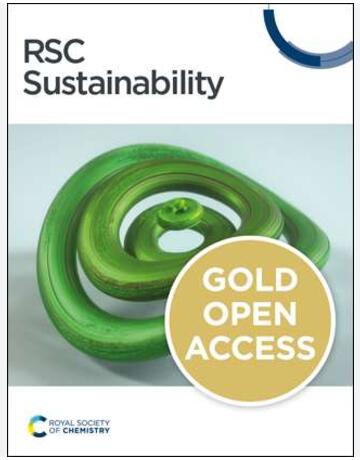The Impact of Renewable Electricity Output on Sustainability in the Context of Circular Economy: A Global Perspective
IF 3.3
3区 环境科学与生态学
Q2 ENVIRONMENTAL SCIENCES
引用次数: 2
Abstract
In this article, we investigate the impact of “Renewable Electricity Output” on the green economy in the context of the circular economy for 193 countries in the period 2011–2020. We use data from the World Bank ESG framework. We perform Panel Data with Fixed Effects, Panel Data with Random Effects, Weighted Last Squares-WLS, and Pooled Ordinary Least Squares-OLS. Our results show that Renewable Electricity Output is positively associated, among others, with “Adjusted Savings-Net Forest Depletion” and “Renewable Energy Consumption” and negatively associated, among others, with “CO2 Emission” and “Cooling Degree Days”. Furthermore, we perform a cluster analysis implementing the k-Means algorithm optimized with the Elbow Method and we find the presence of four clusters. In adjunct, we confront seven different machine learning algorithms to predict the future level of “Renewable Electricity Output”. Our results show that Linear Regression is the best algorithm and that the future value of renewable electricity output is predicted to growth on average at a rate of 0.83% for the selected countries. Furthermore, we improve the machine learning analysis with a Deep Learning approach using Convolutional Neural Network-CNN but the algorithm is not appropriate for the analyzed dataset. Less complex machine learning algorithms show better statistical results.循环经济背景下可再生电力输出对可持续性的影响:全球视角
在本文中,我们研究了2011-2020年期间193个国家在循环经济背景下的“可再生电力输出”对绿色经济的影响。我们使用来自世界银行ESG框架的数据。我们使用固定效应的面板数据、随机效应的面板数据、加权最后二乘法(wls)和合并普通最小二乘法(ols)。研究结果表明,可再生能源发电量与“调整后储蓄-净森林损耗”和“可再生能源消耗”呈正相关,与“二氧化碳排放量”和“冷却度日”呈负相关。此外,我们执行了一个聚类分析,实现k-Means算法与肘部方法优化,我们发现存在四个聚类。此外,我们面对七种不同的机器学习算法来预测未来的“可再生电力输出”水平。我们的研究结果表明,线性回归是最好的算法,并且所选国家的可再生电力产出的未来价值预计将以平均0.83%的速度增长。此外,我们使用卷积神经网络- cnn的深度学习方法改进了机器学习分析,但该算法不适合分析的数据集。不太复杂的机器学习算法显示出更好的统计结果。
本文章由计算机程序翻译,如有差异,请以英文原文为准。
求助全文
约1分钟内获得全文
求助全文
来源期刊

Sustainability
ENVIRONMENTAL SCIENCES-ENVIRONMENTAL SCIENCES
CiteScore
6.80
自引率
20.50%
发文量
14120
审稿时长
17.72 days
期刊介绍:
Sustainability (ISSN 2071-1050) is an international and cross-disciplinary scholarly, open access journal of environmental, cultural, economic and social sustainability of human beings, which provides an advanced forum for studies related to sustainability and sustainable development. It publishes reviews, regular research papers, communications and short notes, and there is no restriction on the length of the papers. Our aim is to encourage scientists to publish their experimental and theoretical research relating to natural sciences, social sciences and humanities in as much detail as possible in order to promote scientific predictions and impact assessments of global change and development. Full experimental and methodical details must be provided so that the results can be reproduced.
 求助内容:
求助内容: 应助结果提醒方式:
应助结果提醒方式:


